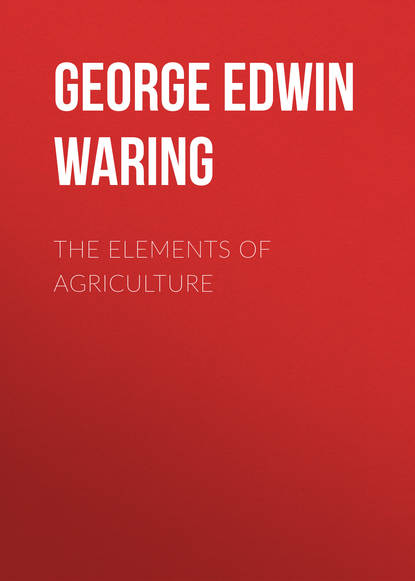По всем вопросам обращайтесь на: info@litportal.ru
(©) 2003-2024.
✖
The Elements of Agriculture
Настройки чтения
Размер шрифта
Высота строк
Поля
How does it affect the protoxide of iron?
How does it neutralize the acids in the soil?
How does it affect its organic parts?
How does it form nitric acid?
How may it affect excrementitious matter of plants?
What effect has it on the mechanical condition of the soil?
Oxygen, though not taken up by plants in its pure form, may justly be classed among manures, if we consider its effects both chemical and mechanical in the soil.
1. By oxidizing or rusting some of the constituents of the soil, it prepares them for the uses of plants.
2. It unites with the protoxide of iron, and changes it to the peroxide.
3. If there are acids in the soil, which make it sour and unfertile, it may be opened to the circulation of the air, and the oxygen will prepare some of the mineral matters contained in the soil to unite with the acids and neutralize them.
4. Oxygen combines with the carbon of organic matters in the soil, and causes them to decay. The combination produces carbonic acid.
5. It combines with the nitrogen of decaying substances and forms nitric acid, which is serviceable as food for plants.
6. It undoubtedly affects in some way the matter which is thrown out from the roots of plants. This, if allowed to accumulate, and remain unchanged, is often very injurious to plants; but, probably, the oxygen and carbonic acid of the air in the soil change it to a form to be inoffensive, or even make it again useful to the plant.
7. It may also improve the mechanical condition of the soil, as it causes its particles to crumble, thus making it finer; and it roughens the surfaces of particles, making them less easy to move among each other.
These properties of oxygen claim for it a high place among the atmospheric fertilizers.
WATER
Why may water be considered an atmospheric manure?
What classes of action have manures?
What are chemical manures? Mechanical?
Water may be considered an atmospheric manure, as its chief supply to vegetation is received from the air in the form of rain or dew. Its many effects are already too well known to need farther comment.
The means of supplying water to the soil by the deposit of dew will be fully explained in Section IV. (#x7_pgepubid00161)
CHAPTER XI
RECAPITULATION
Manures have two distinct classes of action in the soil, namely, chemical and mechanical.
Chemical manures are those which enter into the construction of plants, or produce such chemical effects on matters in the soil as shall prepare them for use.
Mechanical manures are those which improve the mechanical condition of the soil, such as loosening stiff clays, compacting light sands, pulverizing large particles, etc.
What are the three kinds of manures?
What are organic manures, and what are their uses? Mineral? Atmospheric?
Manures are of three distinct kinds, namely, Organic, mineral, and atmospheric.
Organic manures comprise all vegetable and animal matters (except ashes) which are used to fertilize the soil. Vegetable manures supply carbonic acid, and inorganic matter to plants. Animal manures supply the same substances and ammonia.
Mineral manures comprise ashes, salt, phosphate of lime, plaster, etc. They supply plants with inorganic matter. Their usefulness depends on their solubility.
Many of the organic and mineral manures have the power of absorbing ammonia arising from the decomposition of animal manures, as well as that which is brought to the soil by rains—these are called absorbents.
Atmospheric manures consist of ammonia, carbonic acid, oxygen and water. Their greatest usefulness requires the soil to allow the water of rains to pass through it, to admit of a free circulation of air among its particles, and to contain a sufficient amount of absorbent matter to arrest and retain all ammonia and carbonic acid presented to it.
What rule should regulate the application of manures?
How must organic manures be managed? Atmospheric?
Manures should never be applied to the soil without regard to its requirements.
Ammonia and carbon are almost always useful, but mineral manures become mere dirt when applied to soils not deficient of them.
The only true guide to the exact requirements of the soil is chemical analysis; and this must always be obtained before farming can be carried on with true economy.
Organic manures must be protected against the escape of their ammonia and the leaching out of their soluble parts. One cord of stable manure properly preserved, is worth ten cords which have lost all of their ammonia by evaporation, and their soluble parts by leaching—as is the case with much of the manure kept exposed in open barn-yards.
Atmospheric manures cost nothing, and are of great value when properly employed. In consequence of this, the soil which is enabled to make the largest appropriation of the atmospheric fertilizers, is worth many times as much as that which allows them to escape.
SECTION FOURTH.
MECHANICAL CULTIVATION
CHAPTER I
THE MECHANICAL CHARACTER OF SOILS
What is the first office of the soil?
How does it hold water for the uses of the plant?
How does it obtain a part of its moisture?
The mechanical character of the soil is well understood from preceding remarks, and the learner knows that there are many offices to be performed by the soil aside from the feeding of plants.
1. It admits the roots of plants, and holds them in their position.
2. By a sponge-like action, it holds water for the uses of the plant.






